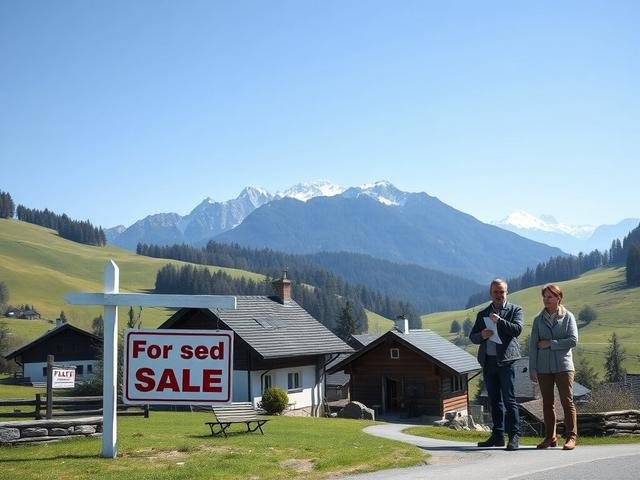In recent years, Austria, known for its high standard of living and stable economy, has faced an unexpected challenge: the rise of forced sales of real estate (Zwangsversteigerungen). This trend is causing concern among economists and ordinary citizens alike. 🏘️ Why is this happening and what does it mean for the real estate market and the country's economy? Let's find out.
Forced sales are not just dry statistics, they are stories of people who have faced financial difficulties. Understanding the reasons for this phenomenon and its possible consequences will help us better navigate the current situation and make informed decisions.
Reasons for the rise of forced sales in Austria 🤔
The increase in Zwangsversteigerungen in Austria is due to a number of factors that interact with each other, creating a complex picture. Let's look at the main ones:
Economic situation and inflation 📈
In recent years, Austria, like many other countries, has faced rising inflation. This has led to an increase in the cost of living, which has hit low- and middle-income families particularly hard. As a result, many people are having difficulty paying their mortgages and other financial obligations.
Interest rates rising 🏦
The European Central Bank (ECB) has raised interest rates several times in recent months to combat inflation. This has led to higher borrowing costs, including mortgages. For many borrowers, this has become an unbearable burden, increasing the risk of defaults and, as a result, forced sales of real estate.
Personal financial difficulties 😔
In addition to economic factors, the increase in Zwangsversteigerungen is also influenced by people's personal circumstances. Job loss, illness, divorce - all this can lead to financial difficulties and the inability to pay the mortgage. Unfortunately, no one is immune from such situations.
Consequences of the COVID-19 pandemic 🦠
The COVID-19 pandemic has had a significant impact on the Austrian economy, especially on sectors such as tourism and retail. Many people have lost their jobs or experienced a decrease in income, leading to an increase in loan defaults and, as a result, to an increase in forced property sales. As an article on wienerzeitung.at, it is important that the authorities pay attention to these problems and develop a strategy to solve them.
Consequences of the growth of Zwangsversteigerungen 🏘️
The rise in forced property sales has serious implications for both individuals and the economy as a whole.
For individuals and families 💔
Losing a home is always a tragedy for a family. It is not only a financial blow, but also emotional stress, loss of stability and a feeling of insecurity. Children who are forced to change schools and friends have a particularly hard time coping with such situations.
For the real estate market 📉
The increase in Zwangsversteigerungen could lead to a decline in property prices, particularly in areas where the process is most pronounced. This could put pressure on the market and make it more difficult for those who are not in financial difficulties to sell their property.
For the economy as a whole 🇦🇹
An increase in forced home sales could have a negative impact on economic growth as it could lead to a decline in consumer spending and investment. It could also increase the burden on social services that are supposed to help people who have lost their homes.
What to do if you are facing financial difficulties? 🤝
If you are having trouble paying your mortgage, don't despair and don't wait until the situation becomes critical. Here are some tips that may help you:
- Contact the bank. Talk to your bank and ask about restructuring your loan. They may offer to lower your interest rate or extend the loan term to reduce your monthly payments.
- Please consult a financial advisor. A financial advisor can help you develop a debt management plan and find ways to increase your income.
- Seek help from social services. In Austria, there are various social programs that can provide financial assistance to people who find themselves in difficult situations.
How to buy a property on Zwangsversteigerung? 💰
Despite the negative consequences of the increase in Zwangsversteigerungen, for some people this may be an opportunity to buy a property at a bargain price. However, before participating in the auction, it is necessary to carefully weigh the pros and cons.
Risks and benefits ⚖️
Buying a property on Zwangsversteigerung involves certain risks. For example, you will not be able to view the property before the auction and will have to buy it "blindly". In addition, legal problems may arise due to previous owners of the property.
On the other hand, buying a property on Zwangsversteigerung can be advantageous, as the prices for such properties are usually below the market price. This can be a good opportunity for those who want to buy a property at an affordable price.
How to participate in the auction? 📝
To participate in the auction, you need to register and make a deposit. Before the auction, you should carefully study the information about the property and estimate its value. During the auction, you need to bid to outbid other participants. If your bid is the highest, you will become the winner of the auction and will be able to purchase the property. As stated on the website edikte.justiz.gv.at, where you can find current announcements about forced sales.
Conclusion and findings
The increase in forced sales of real estate in Austria is a serious challenge that requires attention from the authorities and society. It is important to understand the causes of this phenomenon and its possible consequences in order to make informed decisions and provide assistance to those who find themselves in a difficult situation. 🤔
If you are facing financial difficulties, do not hesitate to seek help from specialists. And remember that there is always a way out of any situation! 🙏
If this article was helpful, please share it with your friends! 📢







